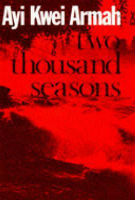 “If there is only one book within this collection that one must read, this is it.” –Sacred Fire: The QBR 100 Essential Black Books
“If there is only one book within this collection that one must read, this is it.” –Sacred Fire: The QBR 100 Essential Black Books
“That we the Black people are one people we know. Destroyers will travel long distances in their minds and out to deny you this truth. We do not argue with them, the fools. Let them presume to instruct us about ourselves. That too is in their nature. That too is in the flow of their two thousand seasons against us. With this searing indictment, Ayi Kwei Armah tellus us of the way of our ancestors and of our prophesied two-thousand-year walk in the valley of the destroyers… Entwining fable and fact, Armah delivers both a saddening and scathing account of our fall from grace. He tells also of the way that we left behind: Our way is reciprocity. The way is wholeness. Our way knows no oppression. The ways destroys oppression. Our way is hospitable to our guests. the way repels destroyers. Our way produces before it consumes. The way produces far more than it consumes. Our way creates. the way destroys only destruction.” –Sacred Fire
Review: Two Thousand Seasons
“The two thousand seasons of the title of Ayi Kwei Armah’s novel represent the enormous arc of time of African history covered in it. “We are not a people of yesterday”, begins the first chapter, but the book does cover the long and awful yesteryears that were traversed and endured. The book hopes to put it behind: “Soon we shall end this remembrance,” Armah writes near the close of the novel, “the sound of it.” And the hope is for the present and especially the future. Armah’s novel is a pan-African epic. In many ways it is a summing up of the African experience for the past two thousand seasons. Armah reduces it effectively to “a thousand seasons wasted wandering amazed along alien roads, another thousand spent finding paths to the living way. Two Thousand Seasons is a novel of seeking, of loss and redemption. He warns: “Woe the race, too generous in the giving of itself, that finds a highway not of regeneration but a highway to its own extinction.” He traces the paths taken: the many false ones, and the true ones.” —The Complete Review
Submit your review | |


